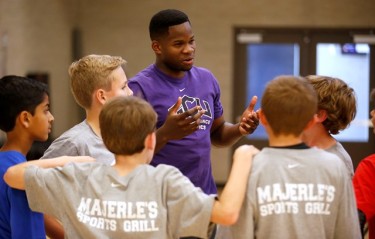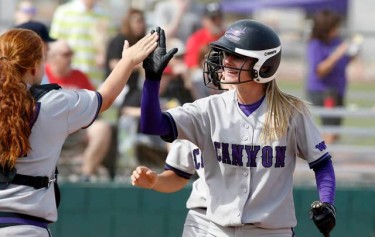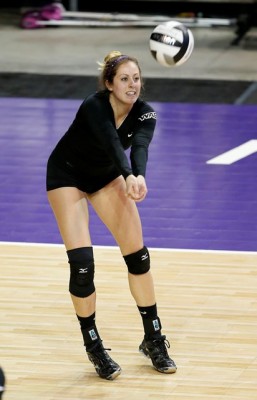Third of a five-part series
Story by Rick Vacek
Photos by Darryl Webb
GCU News Bureau
Jerome Garrison remembers sitting in the office of Brian Mueller, Grand Canyon University’s president and CEO, during his recruiting visit his senior year in high school and talking about Mueller’s vision for the University in general and the men’s basketball program in particular.
“It was just me and him,” Garrison said. “He laid out for me everything that they were planning to do, year by year. He even talked about expanding the Arena. He knew exactly what he wanted to do, and then he went out and did it. With someone like that leading the charge, it makes you want to work out that much harder.”
A big part of that vision, of course, was the move to NCAA Division I, a four-year transition that GCU began with the 2013-14 academic year. With that announcement, it became the athletes’ mission to carry out Mueller’s plan and to do it enthusiastically even if the challenges (tougher travel, tougher opponents) can get overbearing at times.
The fact that GCU enjoyed so much success both on and off the field in its first year in D-I is a testament to the plan but also to the execution – and the plan wasn’t going to be executed well unless the 450 athletes collectively bought into the idea.
“You can’t be scared,” Garrison said. “You have to be excited and ready to play.”
Today’s installment is about three of those athletes. One is from a fall sport (volleyball player Mackenzie Phelps), one is from the winter (Garrison, a standout on the basketball team) and one is from the spring (Haley Walker, an outfielder on the softball team). All three will be seniors in 2014-15.
Their results were all different last season – women’s volleyball finished 12-19, men’s basketball was 15-15 and the softball team won the Western Athletic Conference regular-season championship – but all three agreed on one thing: A big reason why they and their peers felt so good about the way they handled the D-I transition is because of the atmosphere for athletes at GCU.
“There are so many athletes here compared to a regular campus,” Phelps said. “It seems like I can’t go anywhere without bumping into at least one or two.”
Garrison said, “I’ve been to games for every single sports team at least a couple of times. GCU is more like a family instead of random people.”
Because it’s a relatively small campus and those athletes are in such close quarters, virtually any game on campus will have athletes from other sports in attendance. The men’s and women’s volleyball teams support each other, for obvious reasons. At basketball games, both men’s and women’s, the softball players were among the GCU athletes who loudly showed their support.
“It was a blast,” Walker said. “Of course, it was a bit of a problem when we’d go to lift weights the next morning and half the team didn’t have a voice.”
As the school year went on, athletes who had gotten a taste of the spicier D-I competition were asked to share some thoughts about their experiences, the better to prepare the rest for what was to come. That was a valuable tool for the softball team on its way to the title.
“They said it’s intense. They said it’s a huge jump. They all talked about being mentally tough,” Walker said. “When we knock someone down, we tend to try to show good sportsmanship and help them up. But they said in D-I they usually won’t help you up. It’s definitely a no-mercy type of thing.”
The mental aspect was crucial, all three athletes agreed. It’s not as if they were cowering in the corner of their dorm room or apartment when they heard the news about D-I, but there was a lot to process beforehand and then a lot to adjust to once the season began.
Garrison met the challenge as well as anyone. He averaged 16.5 points per game and 20.3 in WAC play, up from 8.2 overall and 7.7 in GCU’s former conference in D-II, the Pacific West, the previous year.
“I just realized things I could do on the court,” he said. “A lot of that came from Coach (Dan) Majerle. We were always talking, always watching film. I just wanted to keep getting better and better, stronger and stronger, faster and faster. My shot got better. I attacked the hoop better.”
A wrist injury slowed him as the season went on, but he said the main challenge was fatigue from all the travel and increased demands of D-I. “It was like being in the NBA Finals – my legs were tired,” he said. He’s working to make sure that doesn’t happen again and said he’s glad that Majerle stresses conditioning as much as he does.
Walker had a similar experience with fatigue during the Antelopes’ march to the WAC softball title. “You’re going to get worn out,” she said. “It’s such a roller-coaster ride.”
But Walker and her teammates were undeterred as they won all five of their conference series, two of them with sweeps. Looking back on it, she said, the best thing that could have happened to them was losing to some D-I softball powers early in the season.
“After nonconference, no one else we played was going to be as good as them,” Walker said. “We had played the best, teams that had played for the national championship. Some games we didn’t even have scouting reports, but I felt like that was better for us.
“We just said, ‘OK, if they have enough respect for us to play us, to play such a small school, we have nothing to lose. Let’s see what we can do.’ The games that we lost were huge steppingstones for us.”
Of the whole D-I experience, Walker said, “It was definitely fun. There was more riding on every game because the competition was on another level. We definitely made a huge statement.”
And had fun along the way. Both Walker and Phelps talked about how much their teams liked to dance, and the women’s volleyball team had a ball trying to scare one another with various pranks – all of which were captured on video, of course.
“It was like a war on our team, who can scare whom,” Phelps said. “By the end of the season, people were afraid to go around corners.”
It was all about making memories. D-I Year 1 was special at GCU because the athletes made it so. Some of them don’t want their experience here to end.
“It’s weird, this being my senior year already,” Garrison said. “It’s been quite a journey.”
GCU’s journey has just begun.
ALSO IN GCU TODAY: Big money and big plans at Abilene Christian University along with memories of a famous (and funny) fighter.
ABOUT THIS SERIES:
Part 1: GCU came up a winner in Year 1 of D-I. Sidebar: Nebraska Omaha.
Part 2: How three veteran coaches approached and managed the first year. Sidebar: University of the Incarnate Word.
Part 3: Antelope athletes talk about what it took to move up to D-I from D-II. Sidebar: Abilene Christian University.
Part 4: GCU isn't the only university trying to establish itself in a competitive sports market. Sidebar: University of Massachusetts Lowell.
Part 5: Changes and challenges often mark the second year of the D-I transition. Sidebar: Northern Kentucky University.
Contact Rick Vacek at 602.639.8203 or [email protected].






































































